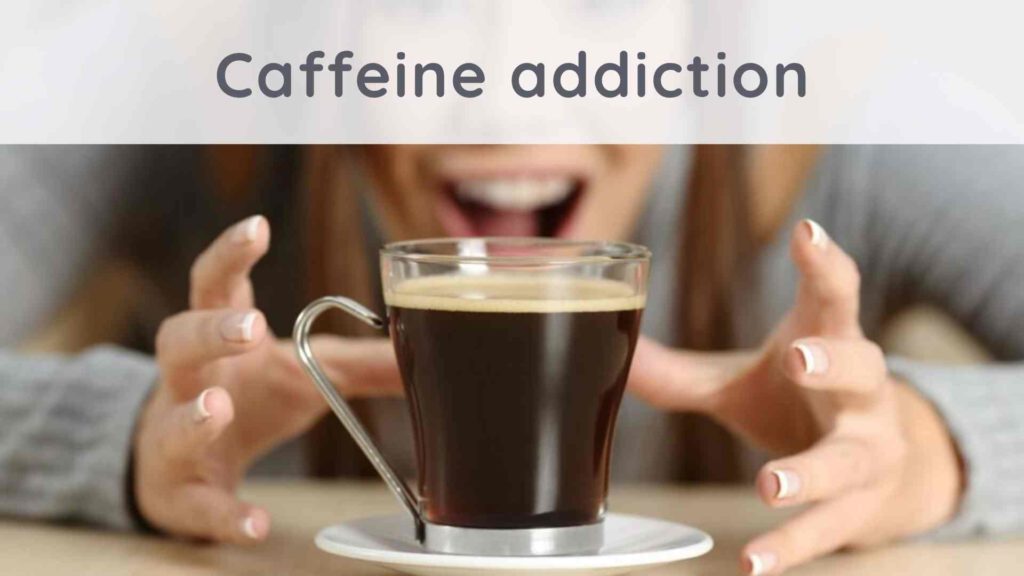Caffeine addiction : how to stop coffee ?
Written by: Loris Vitry (holistic coach)
Validated by: Cathy Maillot (Osteopath)
Caution: If you have any medical questions or concerns, please speak to your doctor. Even if the articles on this site are based on scientific studies, they do not replace professional medical advice, diagnosis or treatment.

Are you addicted to coffee?
You are not the only one!
Around the world, 2.3 million cups of coffee are drunk every minute.
Over 90% of the French population consumes it, and France ranks 8th country drinking coffee.
5.8 kilos of coffee are drunk on average each year by a French.
In reality, taking a cup of coffee does not present a great danger in itself.
It is taken regularly to relieve stress and relax.
The risk begins when you become more and more addicted to caffeine.
So how do you stop drinking too much coffee?
Is coffee really dangerous?
It is true that energy drinks, gels, and over-the-counter medications also contain caffeine, and unfortunately, it is just as much abused as coffee.
And coffee is addictive for more reasons than the caffeine it contains.
However, coffee also contains certain vital nutrients such as magnesium, B vitamins, and even chromium, a mineral that plays a role in regulating blood sugar.
Regular and modest consumption of coffee has even been associated:
- preventing liver cancer,
- for the treatment of mild depression,
- to treat mild constipation
- and reducing the risk of Alzheimer’s disease and type 2 diabetes.
So why should you drink less coffee?
Because, like everything, drinking too much is not necessarily a good thing.
Too much caffeine makes it difficult for the endocrine system to work.
It also increases the development of mild breast disease.
Not to mention the development of anxiety and sleep disturbances.
When can we talk about coffee addiction?
The maximum recommended daily intake of caffeine is 400 milligrams.
A 220-gram cup of coffee has about 90 milligrams (the espresso has more).
Most heavy consumers drink about 120 to 150 milligrams of caffeine from the first large cup each day.
Abusing coffee can lead to headaches, nervousness, depression, digestive upset, heartburn, and even chronic loss of minerals.
If you suffer from any of these problems or want to stop drinking coffee, here are some tips to help you!
How to stop coffee?
There are many ways to stop your coffee addiction.
However, the best way is to follow a series of steps below.
Identify the cause of the addiction
Examine why you consume so much caffeine and address this problem instead of hiding it.
Is it stress, habit, lack of energy, diet, or some other problem?
Work to eliminate the cause of your addiction to coffee, and it will be easier for you to quit coffee.
Quit gradually
Reduce your intake by one cup a day for one month, then switch to another cup less the following month.
If you drink several cups of coffee a day, it will be easier than for those who only drink one or two.
If you only drink one or two, reduce your consumption by half a dose until you stop completely.
Replace your daily dose with decaffeinated coffee
For some people, it’s not caffeine that makes them want more coffee.
It’s the warm feeling of coffee and the cheerful vibrations it brings.
You can still enjoy (and possibly enjoy) coffee consumption by taking a decaffeinated coffee instead of regular coffee.
Get enough sleep
Let your body use its natural energy stores, so it doesn’t have to depend on caffeine to get through the day.
Try to sleep at least 7 to 8 hours a night.
When you go without caffeine, you may need an extra hour of sleep each night.
Give yourself the freedom to do this and give your body the rest it deserves.
Try matcha green tea
Although matcha tea still contains caffeine, the dosage remains weak compared to coffee and is not as stimulating.
It is very rich in amino acid, the theanine which it contains helps to reduce stress, and even to balance the blood sugar level.
Matcha also boosts mood and energy and does not cause insomnia like coffee.
You can add it to smoothies, lather it with a whisk in hot water, or steep it in a teapot.
Find new drinks you enjoy
It’s always helpful to focus on the positive side of things when trying to quit an unhealthy habit, so find other drinks you might like to replace coffee.
For example, try smoothies, protein shakes, or alternatives to hot herbal coffee instead.
Try the roasted cocoa beans
Roasted cocoa beans contain no caffeine, sugar, or fat, and they have a warm, smoky taste, just like coffee.
To reduce your addiction, start by mixing it with your cup of coffee, this will increase energy levels without harming health.
Reduce your caffeine intake in general
Often people are not only addicted to coffee but all sources of caffeine such as black tea, energy drinks, and chocolate.
This can more easily lead to addiction to coffee.
So try to cut back on all sources of caffeine, not just coffee.
This approach is much healthier in the long run and will help you feel better faster.
Don’t give up if you want to quit coffee, and don’t hesitate to have a cup of it occasionally or once a day if you enjoy it.
Black coffee remains a much better choice than sodas or other sugary drinks, and it has considerable health benefits that should be considered in moderate amounts.
A word of advice, so avoid addiction.
Continue reading:
Tinnitus: how to relieve ringing in the ears?

